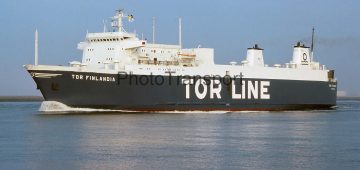by Paul Gonzalez-Morgan
LNG is considered to be the “fuel of the future”. Do you share this view?
Yes I do. Whilst I do not consider it to be the only fuel of the future, evidence and trends out there suggest that it is a matter of when and not if LNG becomes a prime source of energy for propulsion and electricity generation in the shipping world. LNG is already a proven and commercially viable solution, albeit currently only used in niche sectors. In the shorter term, we will continue to see a combination of different solutions such as scrubbers and distillate fuels being used as more restrictions are introduced. But in the longer term, LNG is likely to be one of the few options that can comply with the increasingly restrictive national and international regulations on requirements for emissions of harmful pollutants, such as sulphur oxides, nitrogen oxides and carbon footprints. At the Port of Gibraltar we are very excited at the prospect of developing the infrastructure for LNG bunkering in partnership with Shell over the coming months.
The cruise industry has been growing over the past 20 years. Do you foresee sustainable growth in the future?
There is certainly no sign of an imminent slowdown in this sector. It is still considered to be a relatively ‘young’ industry and there are several reasons why one should be optimistic about the future. The biggest opportunity appears to be in attracting new-to-cruise customers. Secondly, larger and newer builds offer increasing capacity. There were seven new cruise ships in 2015 – another fifteen in 2016 and 2017 will see a substantial increase in passenger capacity. In addition, more local ports and destinations, and new onboard and ashore activities, together with growth in emerging markets such as Asia should see the passenger growth rate in the industry match or exceed the 7.2% annual average seen since 1990. Here in Gibraltar, we seek to consolidate our position as a successful and popular cruise destination, where a cruise ship arrives into port within an hour of leaving the main shipping lanes, and the passengers can be enjoying the attractions or excursions within minutes of berthing.
Bunkering is a specialised sector with high regard for safety standards. What advice could you give ports that are starting to introduce bunkering as part of their shipping services?
Bunkering is an industry which has suffered from negative associations, particularly in light of the environmental impact of oil spills caused by vessel casualties losing their bunker fuels. The fact that most of these issues are not directly related to or caused by bunker supply operations is something which is mostly overlooked when considering this. Any port looking to (or already undertaking) bunkering activities therefore has a strong incentive to have a bunkering regulatory regime which demonstrably shows the highest safety and environmental standards incorporated. This will also assist in making the bunkering industry successful. In today’s world ship owners and operators will be loath to call at ports which are not associated with high standards.

Generally, how important should the environment be in shipping?
As individuals, we all have an important role to play in striving for a cleaner environment. As an industry (shipping and related sectors such as ports and terminals), we have a collective responsibility. This is made harder by shipping’s poor track record on environmental issues, so we must be seen to be exploring and seizing every opportunity to deliver cleaner, more efficient modes of transport. Whilst significant progress has been made in recent years there is still evidence of bad practice, such as vessels deliberately routed to avoid burning fuel in emission control areas (ECA), in turn maximising the time where they can burn cheaper fuel, containing higher amounts of sulphur. Conversely, there is also plenty of evidence of responsible behaviour where cargo owners and shippers try to pick their vessels on the basis of sensible and accepted greenhouse gas emission performance criteria. But, as a community, we need to be ambitious in our aspirations. Proactive action and industry wide agreements on voluntary targets are, in my view, a prudent way to avoid potentially unrealistic rules imposed by external regulators.
What more can be done by the shipbreaking countries in improving their reputation?
Shipbreaking is a global industry. The challenges facing the wider shipping community regarding this activity therefore require a holistic approach if we are to see positive results. The shipbreaking countries need robust political and legislative action to protect workers’ rights and working conditions, whilst demanding and enforcing internationally acceptable shipbreaking practices. Shipbreaking companies must make it mandatory for their workplaces to maintain minimum safety standards through a concerted campaign of awareness programmes and close supervision. This needs to be accompanied internationally by strict adherence to the likes of the Hong Kong convention and EU Ship Recycling Regulation by shipping companies, together with a commitment to place workers’ rights and the environment above profit, when choosing shipbreaking facilities.
What role does marketing play in promoting shipping, and how is this applied by the GPA?
Marketing is a fundamental component part of the strategy of anyone involved in the shipping industry. We operate in a hugely competitive environment against very tight margins and marketing one’s products or services is beneficial to both the supplier and the customer in identifying optimum solutions. At the GPA we place marketing at the forefront of our business, following a three strand approach, advertising, attending and sponsoring high profile industry conferences and conventions, and, most importantly, direct engagement with ship owners and operators. At the Port of Gibraltar we value our hard earned first class reputation as a centre of innovation and maritime excellence. But we are by no means complacent, open dialogue with the shipping community allows us to better understand their needs, so that we may adapt and evolve in order to continue providing the best possible service to ships calling at Gibraltar.
In your view, what key transformations will the shipping industry experience over the next few years?
The two key factors likely to drive transformation in the future are technology and the environment. No stones are being left unturned by the shipping industry in the drive to contribute towards a greener marine environment. We will continue to see advances in cleaner fuels, ballast water management, more efficient propellers and rudders, hull paints and waste heat recovery systems. In the longer term, in an age of aerial drones and driverless cars and trains, the most revolutionary, if not controversial, development could well be the emergence of unmanned and autonomous ships. Whilst there are significant technological and socio political challenges to overcome, the benefits are clear and much of the technology already exists.
Your memorable maritime experience and favourite ship?
My (generic) memorable maritime experience is the thrill you experience as you pull into a port for the first time, be it on a small yacht or an aircraft carrier. Specifically, the excitement of steaming eastward through the Strait of Gibraltar during the morning watch, cup of coffee in hand, as you see the crouched lion silhouette of the Rock appear against the rising sun would be hard to beat!

As for favourite ship, it would have to be my two commands during my time in the Royal Navy, the Minehunter Berkeley and the frigate Grafton, a wonderful experience and privilege. But I have to say that, as a proud Gibraltarian, I am extremely delighted to be back in my birthplace and contributing to the well-being and continued development of such a dynamic and vibrant port.






Comments
Sorry, comments are closed for this item